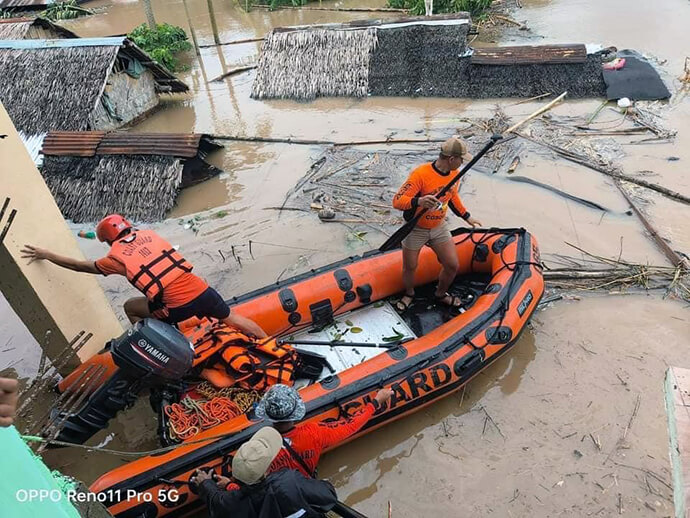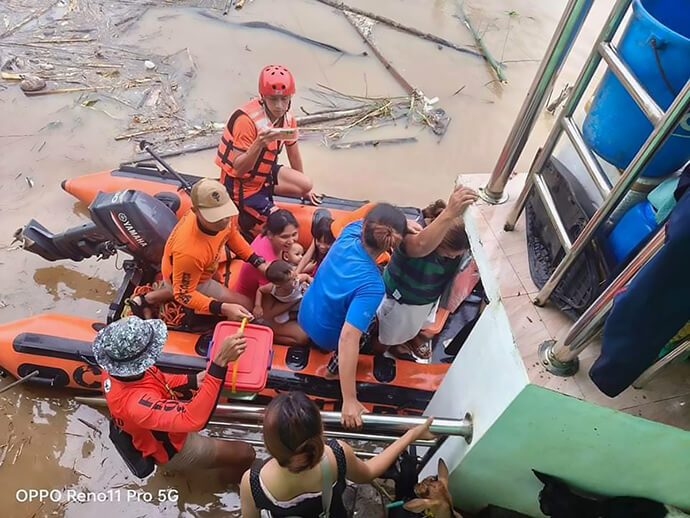Key points:
- Filipino United Methodists are rallying to help survivors of a series of tropical storms that have caused massive flooding.
- In the wake of Tropical Storm Trami’s devastation, the Bicol Philippines Conference provided food packs to about 600 families across the region.
- The Philippines Central Conference offered a special collection to bolster relief funds, and United Methodist-related Wesleyan University organized fundraising drives to aid typhoon victims.
Filipino United Methodists are rising up to help the survivors of a series of strong storms that ravaged the Philippines over the span of several weeks.
The Rev. Nonelio Talisic, superintendent of the Central Bicol District and administrative pastor of First United Methodist Church in Naga City, said that the people of Bicol, though accustomed to bracing for storms, “found themselves caught off guard by the silent but destructive arrival” of Tropical Storm Trami (called Kristine in the Philippines) in late October.
Trami, along with the previous Typhoons Yinxing (Marce) and Kong-rey (Leon), left more than 160 people dead and over 9 million people in the Philippines dealing with extreme flooding, according to The Associated Press.
Three more storms, Typhoons Toraji (Nika), Usagi (Ofel) and most recently Man-yi (Pepito), followed on their heels, making this the most active November on record for the Pacific typhoon season.
How to help
The United Methodist Committee on Relief’s International Disaster Response and Recovery serves as the primary channel for United Methodist assistance for disasters that strike outside of the United States. Donate to https://umcmission.org/advance-project/982450/.
“Many United Methodist churches across the region are cut off due to impassable roads, landslides and damaged infrastructure,” Talisic said. “The sudden downpour led to widespread flooding across several provinces, with some areas still underwater days after the storm passed.
“Flood control structures crumbled under the pressure, and roads and critical infrastructure suffered extensive damage from landslides.”
But, he noted, the response from The United Methodist Church and others has been quick.
“The outpouring of aid has underscored the spirit of connectionism, with financial support, food, clothing and drinking water provided by churches, private institutions, the government and individual donors alike,” he said.
He said the Bicol community remains resilient, yet the experience serves as a stark reminder of the region’s vulnerability to natural disasters and the effects of climate change.
Talisic said recovery efforts are ongoing, “with teams working tirelessly to restore basic services and aid residents in rebuilding their lives.”

The Rev. Jerome Alvarez, North Bicol District superintendent, said that in the wake of Kristine’s devastation, the Bicol Philippines Conference mobilized its first wave of relief operations, providing food packs to approximately 600 families across the region.
“Led by the Bicol Philippines Disaster Risk Reduction and Management team and the conference board of Church and Society, the relief efforts aim to bring critical supplies to the hardest-hit communities,” he said.
A second wave of food distribution was scheduled, along with a campaign to gather additional resources for ongoing recovery efforts, particularly to help rebuild damaged homes, Alvarez said. He expressed thanks to United Methodist-related Wesleyan University-Philippines for donating nearly $3,000.
Food shortages continue to be a pressing issue, he said, particularly in Camarines Sur. “Many rice storage facilities remain underwater; access to basic food items like rice is limited, posing challenges to the continuity of relief distribution,” he said.
Guided by Bishop Israel M. Painit of the Davao Area, Alvarez said that the Bicol Philippines Conference has developed a strategic plan to address both the immediate and long-term needs of the region.
“This includes prioritizing United Methodist Church outreach areas while coordinating with the National Council of Churches in the Philippines and the (Disaster Risk Reduction and Management) team for a broader response across Bicol.”
Gratitude has poured in from local communities for the support received from the broader Philippines Central Conference, which offered a special collection to bolster relief funds.
Wesleyan University, in particular, has played a significant role by organizing fundraising drives to aid typhoon victims in Bicol.
“In times of adversity, we are reminded that strength lies in unity, collaboration and resilience,” said Bishop Painit. “When waters rise, so must our hope, compassion and willingness to lift each other. Let us manifest our support for those affected, and together, let us build each other up.”

The Rev. Arvin R. Corpuz, Aurora District superintendent in the Middle Philippines Conference, said the recent typhoons have dealt a significant blow to the communities of Dibulo and Dinapigue in Isabela, impacting both livelihood and daily life.
“Although no lives were lost, the storms have taken a toll on livestock and agriculture, with over 70 animals, including goats, cows and pigs, drowned by floods.”
Corpuz said that crops also have suffered, noting one pastor in the region whose banana plantation was devastated, resulting in a complete loss of this year’s harvest.
“The storms also damaged homes, brought down trees and temporarily suspended schools,” he said, noting that children faced nearly three weeks of disrupted classes.
Churches were similarly affected, with numerous services canceled due to storm-related repairs and cleanup efforts as congregants focused on home repairs and assisting their areas.
“Efforts to support these affected communities continue, but the long-term effects on livelihoods and education remain a concern as residents work to rebuild amidst ongoing challenges,” Corpuz said.
Bishop Rodel M. Acdal of the Baguio Area said the devastation in Northern Luzon has been overwhelming.
“For the past month, our brothers and sisters in Northern Luzon have endured unimaginable challenges as Typhoons Kristine, Leon, Marce, Nika, Ofel and now Pepito wreaked havoc across the region. These storms caused massive flooding, destroyed homes, livelihoods, schools and even church sanctuaries,” he said.
Subscribe to our
e-newsletter
Baguio Episcopal Area disaster management coordinator Mai Galario Yesan highlighted the severity of Typhoon Marce’s impact across multiple regions, with more than 7,000 families initially displaced. By Nov. 13, affected numbers surged to 110,841 families.
“The storm affected three regions, 10 provinces and 943 barangays, with pre-emptive evacuations reaching 34,501 people,” she said.
The Rev. Excelsis Ato Biteng, Northeast Cagayan District superintendent, said despite the devastation, the families in her area are resilient.
“Schools were destroyed by Typhoon Marce. So many families lost their houses, but they are resilient. The next day, they get up and do some repairs if repairable.”
While discussing the effects of Marce with UM News, the area was anticipating the coming of Ofel the following day. Biteng said three local churches are under water after Marce.
Wilson Constantino, lay leader and a member of the disaster risk reduction management team in Northeast Cagayan, said the church is prepared to offer support in situations like this.
“We have a definite support to alleviate the plight of many families who lost homes and livelihood,” nothing that the storms have been especially hard on farmers.
“Much time is required before the harvest. Rice grains are not mature yet, but if they submerge in water, the entire grain is lost,” Constantino said.
He said that in response, local churches, districts and annual conferences are urged to support affected communities with essential supplies, including food packs, sanitation kits, hot meals and cleaning materials.
“Efforts are ongoing to provide sanctuary for displaced survivors, with a focus on delivering aid and fostering recovery across devastated areas,” Constantino said.
As rare occurrences continue to happen resulting from warmer oceans that threaten to bring more misery to the storm-weary Philippines, Acdal said United Methodists must stand together.
“Together, as a community of faith, we will rise together and stronger. These calamities also remind us of our responsibility as stewards of God’s creation. The increasing intensity of storms calls us to renew our commitment to environmental stewardship.”
Mangiduyos is a communicator in the Philippines.
News media contact: Julie Dwyer at [email protected]. To read more United Methodist news, subscribe to the free Daily or Weekly digests.




